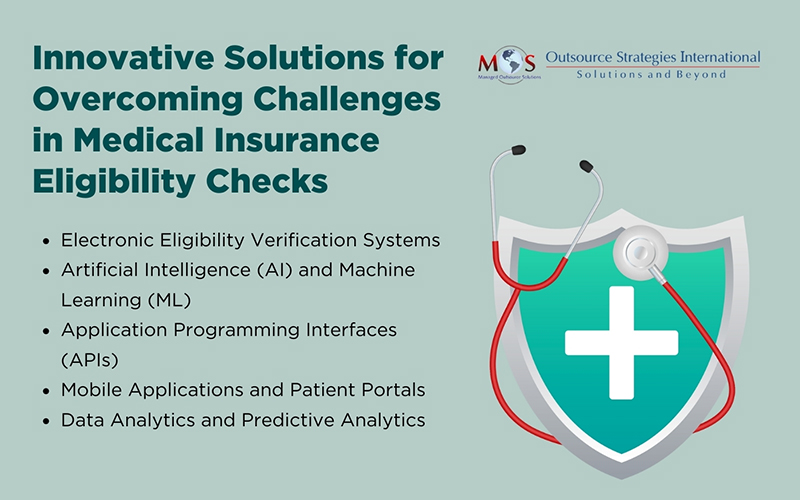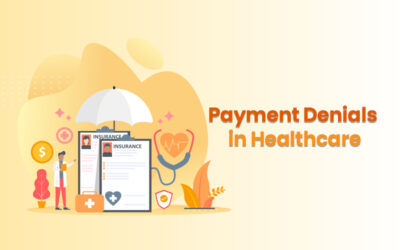Insurance verification is a crucial step in medical billing which aims to ensure that healthcare providers are reimbursed for services rendered to patients. However, various factors can make this process complex and challenging. Overcoming common challenges in insurance eligibility verification is crucial for facilitating smooth operations, preventing denials, and maximizing efficiency in healthcare settings.


Learn how specialized insurance eligibility verification services can improve your revenue cycle
Strategies for Navigating Common Pitfalls in Insurance Eligibility Checks
Here are some key challenges of insurance eligibility verification and strategies to address them:
Inaccurate Patient Information
Verification of patient benefits requires obtaining accurate and complete patient information. However, gathering accurate patient information is one of the most significant challenges that healthcare providers face. Inaccurate patient information, typically caused by human error or outdated records, can lead to claim denials and delayed payments.
To address this challenge, practices should implement robust patient registration processes that capture comprehensive insurance details upfront. This includes verifying and updating patient demographics, insurance coverage, and contact information during each visit. Additionally, utilizing electronic health records (EHRs) and integrating them with insurance databases can help validate insurance information, streamline the verification process, and reduce errors.
Complex Insurance Policies
Understanding and navigating the complexities of various insurance policies and coverage rules is another major challenge. Insurance policies can have numerous coverage limitations, exclusions, and variations, and. understanding the specific requirements of each insurance plan can be difficult.
Providing ongoing training and education for staff members responsible for insurance verification is crucial to overcome this challenge. It will help them stay informed about changes and coverage guidelines of insurance policies. Collaborating with insurance companies, establishing clear lines of communication, and using resources such as online portals and reference guides are also reliable ways to clarify policy details and resolve any uncertainties.
Time-consuming Procedures
Manual verification processes can be time-consuming, leading to delays in patient care and administrative inefficiencies. Implementing automated solutions and technologies can significantly reduce the time and effort required for insurance verification. Electronic eligibility verification systems and real-time claim adjudication tools can reduce errors in the process, providing instant access to accurate insurance information.
However, while automated systems and real-time eligibility checks are useful for many insurance verification scenarios, they may not fully address complex situations. Some procedures or treatments may require additional documentation or prior authorization, which cannot be easily verified automatically. In these cases, a follow-up call or manual verification is necessary to gather the required information and ensure accurate coverage determination. Additionally, follow-up calls and manual verification are essential for identifying and addressing nuances or exceptions related to insurance coverage. For instance, if a patient has a unique insurance plan or an unusual coverage scenario, a follow-up call can provide clarification and prevent potential claim denials or billing errors.
Denials and Appeals
Insurance denials and rejections can occur due to various reasons, including eligibility issues, incorrect coding, or lack of pre-authorization. This can lead to significant revenue loss.
The solution is to implement proactive measures to prevent denials, such as conducting thorough eligibility checks prior to rendering services, ensuring accurate coding practices, and obtaining necessary pre-authorizations when required. Providers also need to establish efficient processes for analyzing denial patterns, identifying the root causes and successfully appealing denied claims. Regular monitoring and analysis of denial trends can help identify areas for improvement and reduce future denials.
Communication Barriers
Communicating with insurance companies to verify coverage, resolve issues, or obtain clarification can be challenging due to long wait times or limited accessibility.
To speed up inquiries and expedite responses, practices need to establish dedicated channels of communication with insurance carriers, such as designated phone lines or online portals. Maintaining open lines of communication with patients is crucial to promptly address any insurance-related concerns or questions.
Data Security and Compliance
Insurance eligibility verification services involves handling sensitive patient information, raising concerns about data security and compliance with healthcare regulations.

Explore this post for valuable insights on optimizing insurance verification process.
Implementing robust data security measures, such as encryption, access controls, and regular audits can safeguard patient information during the verification process. It’s also essential to comply with HIPAA regulations and other relevant standards governing the handling of protected health information (PHI).
Innovations in Patient Insurance Eligibility Checks
We are witnessing the emergence of several innovations for overcoming challenges in medical insurance eligibility checks.
Here are five notable developments:
- Electronic eligibility verification systems: These systems provide instant access to patient coverage details, benefits, and other relevant information by integrating with payer databases.
- Artificial Intelligence (AI) and Machine Learning (ML): AI and ML technologies automate eligibility checks, analyze large volumes of insurance data, and improve accuracy and efficiency over time.
- Application Programming Interfaces (APIs): APIs facilitate seamless data exchange between providers and insurance companies, eliminating manual data entry and integrating eligibility verification systems into existing EHRs.
- Mobile applications and patient portals: These platforms allow patients to conveniently access and manage their insurance information, check eligibility, and submit documentation for prior authorization.
- Data analytics and predictive analytics: Analytics analyze historical data to identify patterns, predict issues, and optimize the verification process, aiding in reducing claim denials and optimizing revenue cycle management.
Enhance Insurance Eligibility Verification with Expert Assistance
To improve efficiency, accuracy, and revenue collection in insurance verification, healthcare providers can implement efficient processes and invest in staff training. Additionally, partnering with an experienced insurance verification company can greatly improve the process and help navigate potential pitfalls. These companies have knowledgeable staff who employ several strategies to ensure smooth communication with payers, leading to quicker and more accurate responses to queries. They stay up-to-date with insurance coverage, terms, conditions, and any updates made by each insurance provider, enabling them to effectively carry out tasks related to insurance verification, claims processing, and other responsibilities in a compliant manner. The assistance of specialists can greatly assist practices in overcoming common challenges in insurance verification.


Optimize your workflow with smooth and accurate insurance verification processes!





